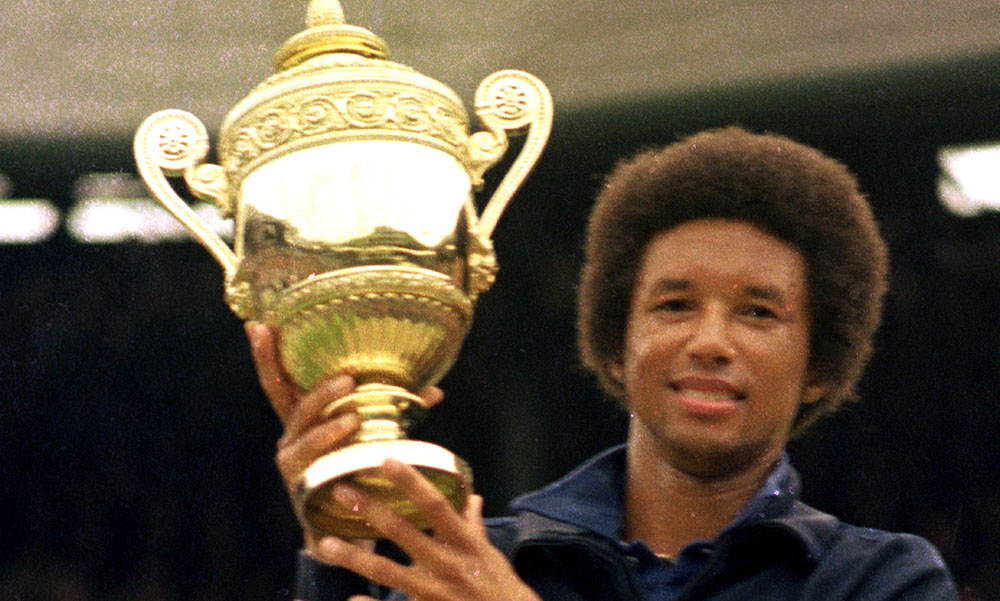You see, when an individual breaks a barrier-a circumstance that prevents progression, they are considered to be a notable force. In the overall history of tennis in North America, Arthur Ashe is one of the most prominent figures of the racket sport. Today (July 10) marks the 75th birthday of the acclaimed tennis legend.
Born and raised in Richmond, Virginia, Ashe was consciously prone to the rattles of racism at a very early age. He has faced circumstances where his own divine color kept him out of tournaments, movie theaters, and American social clubs. Overall discrimination was the reality of the Black man in America, for Ashe it was an aggressive sense of motivation. His presence in the world of tennis, one of the very last athletic fortresses for the white race, was strictly profound simply because of his swift reflexes and his crude hitting power. Because of this force, Ashe recognized himself as a role model for African boys at home and abroad when it came to breaking barriers.
In a 1966 New York Times piece, the tennis legend spelled out his intent with getting into the racket sport profession:
I want to do something for my race, but I figure I can do it best by example, by showing Negro boys the way. That’s what Jackie Robinson and Willie Mays have done in baseball, Wilt Chamberlain, and Bill Russell in basketball, Jim Brown in football. They’re the three big-money sports in the United States, and the Negroes have broken through. They’re already through in track and field, and of course, they always have been in boxing. Boxing is really made for Negro kids, because all you need to be is underprivileged, with a couple of fists.
Arthur Ashe is recognized as the first Black man to reach the heights in the white-dominated tennis world. Amid the late ’60s and throughout the ’70s, he was known to be the only “negro” player in the game, which often placed him under constant public scrutiny. Whenever he beat a high powered player, like Roy Emerson, who he beat back in 1972 for the U.S. National Champion quarter-finals, it’s either a bet were placed on the odds of his next match, or he was being offered large sums of money to project favorable outcomes. Regardless, such acts confirmed Ashe’s power of being a naturally superior player.
In 1963, he was selected to represent the United States in the Davis Cup becoming the first African America to play on the U.S. team. Five years later at the tender age of 25, Ashe became the first Black man to win the singles at U.S. Open and is still the only Black man to hold the milestone. Making him the number one ranked tennis player in the world, in 1975 he became the first Black man to win the singles at Wimbledon.
After retiring in the early ’80s, Ashe went on to contribute his wisdom to his own community. He took on the deed of writing for Time magazine and The Washington Post and eventually landed a hosting gig as a commentator for ABC Sports. With a goal to inspire, he published A Hard Road to Glory: A History of the African-American Athlete where it breaks down the statistics and realities Blacks face all over the globe with the agonizing lines of racism. Most of all, he was an overall revolutionary. Aligning with South Africa, he became a member of a delegation house with 31 members of notable African Americans who were on a mission to monitor the racial assimilation hoarding the land. His revolutionary stance stood as far as even getting arrested at rallies and protests in the name of anti-apartheid and justice for Haitian refugees.
Ashe passed away in 1993 from a case of pneumonia connected to his AIDS diagnosis. He was 49 years old. Prior to his death, he publicly advocated the act of safe sex despite his conception of the illness stemming from blood transfusions. After going public about the illness in the early ’90s, he went on to start the Arthur Ashe Foundation for the Defeat of AIDS where he was an overall ambassador for raising awareness about the illness. With knowledge African-Americans are most prone to such illness, it was only right the overall warrior got real about national prevention.
Arthur Ashe is a prime example of exactly what it means to be Black in America.
